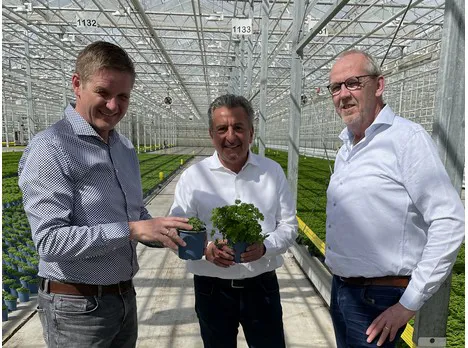Dr. Gunnar Schellenberger, president of the Saxony-Anhalt Landtag, has now seen for himself what sustainable production controlled by high-tech can achieve in one of the largest greenhouse facilities in Europe. He had followed an invitation from the Wimex Group, a company that produces vegetables and organic herbs in the ultra-modern glasshouse in Osterweddingen near Magdeburg and brings them to the stores of regional retailers under the name Bördegarten.
Michael Tepfer, Head of Strategic Corporate Development at the Wimex Group, and Plant Manager Jos Houwen informed the visitors during a tour about the highly efficient and resource-saving production of vegetables and organic herbs as well as the company's current sustainability strategy. State parliament president Dr. Gunnar Schellenberger was particularly impressed by the fact that the greenhouse draws waste heat and roof surface water from its direct neighbor - thus saving valuable drinking water and energy.
Resource-saving potted herb cultivation
Currently, the greenhouse located near Magdeburg has an area of about 63,000 square meters and offers ideal growing conditions for the sustainable production of vegetables (the size of nine soccer fields) and about 3.3 million pots of organic herbs such as parsley, basil, chives, rosemary, dill and mint per year. Exemplary for resource-saving cultivation are the climate-positive cucumbers harvested in Osterweddingen at a rate of up to 50,000 a day. As they grow, they bind more CO2 than is produced by their cultivation. This means that Bördegarten's cucumber production saves the environment around 919 tons of climate-damaging greenhouse gas every year.
"Among other things, this is made possible by state-of-the-art sensors in the glasshouse. They control temperature, water supply, shading, and fresh air supply fully automatically. The important plant nutrients are also precisely adjusted and dosed to the crop and vegetation stage," Michael Tepfer explained. Each cucumber harvested in Osterweddingen under high-tech conditions requires about 4.5 liters of water to grow, he said. Growing in the open or in less professional glass houses would require nearly three times that amount of water - almost 10 liters of water would be saved per cucumber.
"The operation of our Bördegarten greenhouse is thus an ecological milestone," said Michael Tepfer. "Because when we live on a smaller CO2 footprint, we set an example - for our customers and for our children." This is how the use of energy and raw materials is optimized.
 (from left to right): Michael Tepfer (Head of Strategic Corporate Development at the Wimex Group), President of the Landtag Dr. Gunnar Schellenberger, and Jos Houwen (Greenhouse Operations Manager).
(from left to right): Michael Tepfer (Head of Strategic Corporate Development at the Wimex Group), President of the Landtag Dr. Gunnar Schellenberger, and Jos Houwen (Greenhouse Operations Manager).
Season extension thanks to climate-neutral waste heat
It is not only the care and nurturing of the plants that is constantly being optimized in the Osterwedding glasshouse, but also the use of energy and raw materials for the entire building. "Climate-neutral waste heat from the production process of our neighbor f/glass heats the greenhouse in the transitional and winter seasons - extending the season for the crops grown there," explained plant manager Jos Houwen. "The carbon dioxide that our plants need to grow and with which they build biomass in the process of photosynthesis, we deliberately introduce into the greenhouse as leached CO2 from industrial processes."
This slightly changes the air composition in the building compared to the outside air
The CO2 concentration increases from around 0.04 to approximately 0.06 percent by volume. "And most of the water for irrigation also comes from sustainable sources," Michael Tepfer emphasized. "We capture the precipitation on the entire site and use it to supply the plants; in addition, precipitation water from the roof surfaces of the neighboring company f/glass is used, so we were able to replace around 20 million liters of drinking water from the public network. Roof surface water transfer from Amazon, another neighboring company, is currently being planned."
"This is where real regional innovation takes place right on the doorstep of the state capital," summed up Landtag President Dr. Gunnar Schellenberger afterwards. "And I'm also happy to take away a few tips for my greenhouse at home. Let's see how that affects my cucumber harvest then."
For more information: www.wimex-group.com
www.wimex-group.com
www.boerdegarten.de
